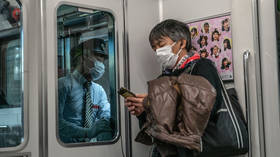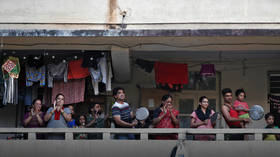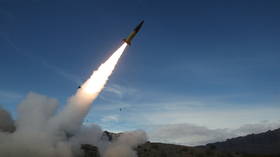Why East beats West in the war against coronavirus

Asian democracies like South Korea, Japan and India are doing a better job than Europe and the US in combating the coronavirus pandemic. Deep social divisions and poor leadership in the West are just two of the reasons.
Even as the coronavirus has spread like wildfire to 199 countries and territories around the world, a pattern of differential extent of devastation is evident. The list of worst affected countries with the highest recorded infections and deaths is overwhelmingly populated by Western democracies.
Barring two exceptions — China, which is unique because the virus originated there and it has a one-party political system, and Iran — a mixture of theocracy and democracy, which is under harsh US economic sanctions — all the top victims are Western democracies. Comparatively, Asian democracies come lower down the list and may succeed in averting the calamitous mass-scale losses in lives and collapse of healthcare that have befallen Europe and the US.
Moral persuasion & stern enforcement
Three interrelated factors explain why Asian democracies are safer. Firstly, they have dynamic and confident leadership. South Korean President Moon Jae-in, Japanese Prime Minister Shinzo Abe and Indian Prime Minister Narendra Modi are commanding figures who enjoy high popularity and legitimacy with their respective citizens. When powerful and unifying politicians are in charge, the public follows and obeys directions and orders, especially during existential crises.
Social compliance with government restrictions has been stronger in Asian democracies. The balanced mix of coaxing with moral persuasion and stern enforcement of rules which Asian leaders have adopted has found a receptive audience in their countries. For example, Modi has begged Indians “with folded hands” (a gesture of extreme humility in India) and sermonized about “responsible citizenship,” while his officials warned those flouting ‘Stay at Home’ orders of jail sentences.
If Asian leaders have convinced most of their people to abide by corona confinements, Western leaders have struggled. The sharp social polarization in Western Europe and the US between ‘liberal’ versus ‘populist’ camps has left large segments of populations bitterly opposing incumbent leaders. US President Donald Trump, Italian Prime Minister Giuseppe Conte, Spanish Prime Minister Pedro Sanchez, and French President Emmanuel Macron are not cutting ice in their divided houses.
The level of trust that citizens must have in governments is low in the West and that has hurt its ability to mobilize people in a time of grave peril. Many Western leaders believe their political survival is delicately poised in such a poisoned atmosphere and hence delayed taking preventive actions to stem community transmission of the coronavirus out of nervousness about their approval ratings and re-election chances.
Also on rt.com US to China: drop dead, we get our jobs back. China’s richest man to US: here, have 1 million masks & Covid-19 test kitsAsian collectivism vs Western individualism
A second factor going in favor of Asian democracies in the war against Coronavirus is culture. Asian societies tend to be collectivist, where citizens have a hardwired willingness to sacrifice individual freedoms and undergo hardships for the sake of common well-being. The degrees of putting society over self vary among South Korea, Japan, India and Indonesia. But taken together and compared to Western Europe and North America, the Asians have an advantage of not seeing the individual and society or society and state as locked in perpetual conflict.
Unlike Western democracies, whose political culture is shaped by asserting individualism, human rights and treating the state as an enemy of liberty, Asians mostly do not worry about violation of privacy or government abuses. One primary reason why Italy, for instance, could not stem the march of coronavirus had to do with the ingrained social practice of ‘Furbo’ (slyness or cunning behavior), whereby citizens are suspicious of perceived state repression and find tricks to evade governmental restrictions. Conte’s pleas that “we should not try to be clever” fell on deaf ears until it was too late.
The surreal sight of British pubs, Italian cafes, Spanish bars, French patisseries and American beaches teeming with mingling crowds in spite of state-imposed social distancing rules contains lessons. Rampant flouting of closure rules, which could have broken the chain of coronavirus transmission, as well as wrenching debates about the threat to civil liberties from creeping excesses of the government, have hampered Western democracies. On the other hand, South Korea faced little public resistance to using intelligence agencies to infiltrate cell phones and credit card details, track minutest movements of citizens, and intrusively perform contact tracing to break the virus’ transmission.
Ability to override business lobbies
The third factor where Asian democracies have come out ahead of Western peers is in their ability to override business lobbies. Politicians like Trump, Johnson, Conte and Merkel waffled on imposing drastic lockdown measures at early stages out of fear that they would upset financial investors and hurt market sentiment.
Even as 1,300 people died in the US (as of March 27), Trump remains obstinate that the nationwide shutdown of businesses must be short and that the state must not interfere in the private sector to fill critical shortages. The fact that the coronavirus-induced economic shock has wiped out three years of the ‘Trump bump’ in the stock markets grates on the US president’s nerves, contributing to his fumbling response.
In contrast, Asian leaders tend to be statist. While none of them love economic recessions or are immune from pressure from business interest groups, these actors do not dominate the calculus of Modi or Moon. Abe did hold out on declaring a national emergency in Japan out of concern for forfeiting the vast commercial investments and sunk costs of the Tokyo Olympics, but he ultimately bowed to the larger public interest on health grounds by moving toward stricter restrictions to confront a “national crisis” and postponing the games.
There could be other idiosyncratic factors why Asian democracies appear to have been spared mass outbreaks of the virus. India enjoys a youthful population, which may reduce the death rate, plus warmer temperatures, which could slow down the transmission.
Japan and India have also not conducted widespread coronavirus testing the way South Korea did, implying their numbers will get worse over time. But the trend lines indicate that Asian democracies are stepping up with measures to avoid the dreaded ‘Phase 3’ of the virus’ transmission that was callously allowed to set in and hammer Western countries.
Quality of political leadership and social attitudes matter in times of catastrophe. East might prove its superiority over the West in this mega crisis. For once, Western democracies and their news media should swallow their pride, keenly observe and learn from their Eastern counterparts.
Think your friends would be interested? Share this story!
The statements, views and opinions expressed in this column are solely those of the author and do not necessarily represent those of RT.














